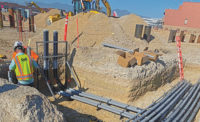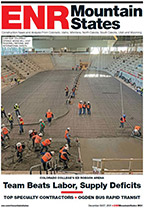Despite forecasts for modest gains in construction activity and employment in Utah and Colorado next year, the region's top specialty contractors remain only "cautiously optimistic." They are hoping for the best and doing what they can to prepare for whatever lies ahead while they deal with lower margins and less work.
The year "2011 was profitable but with significantly less revenue than our past 20-year average," says Kevin Larington, president at Denver mechancial contractor Trautman & Shreve, an EMCOR company. And "2012 looks to be about the same, with some greater opportunity breaking possibly in early 2013."
While some companies have suffered by overreaching for profits, others are thriving by breaking into new territories and specialties. Ludvik Electric Co., Lakewood, Colo., has weathered several down economic cycles throughout its 32-year history. Robert A. Hadley, vice president of estimating, marketing and preconstruction services, says the best opportunities are in the health-care, technology/data and institutional sectors, but there also are prospects in alternative energy. Ludvik is among several firms attempting to offset revenue losses in other sectors with solar-energy projects.
Douglass Colony Group, Commerce City, Colo., is doing its part to promote solar investment in the down economy. The company recently expanded its commercial solar-installation division by bringing a solar financing company in-house. Through its partner company, One Global Renewables, Douglass now offers customers the option of a power purchase agreement, which eliminates the need for upfront capital.
The company hopes the move will prove as beneficial as the 2009 merger that brought metal fabrication in-house. That has proved particularly advantageous in the downturn, allowing Douglass to keep overhead costs down and offer lower bids than competitors who must sub out their fabrication work.
"In this economy, we have to be more than just another commercial contractor fighting for the same scraps of work," says Perry Herrmann, president and CEO of Denver-based E Light Electric Services Inc.
Herrmann credits the company's staying power to the diversity of its services and its expansion into new geography. The electrical contractor broke into the commercial solar and wind markets in 2009 and is now licensed in nine states. This year it expanded its reach into New Mexico, Arizona, Utah and Texas. Despite E Light's continued growth and revenue gains, Herrmann remains skeptical about recovery in the coming year, predicting that "2012 will hold greater challenges for the Colorado construction industry."
Likewise, Mike Skalla, general manager of Daw Construction Group, Draper, Utah, says he is "cautiously optimistic there will be sufficient work to bid and that sustainable margins will return to bidding ."
Until that happens, Daw is being more selective in pursuing projects, he says. "It's a waste of our time to bid on every job out there. There is so much competition for smaller jobs, and we can't compete against the low-ball bids of contractors who work out of their pickup trucks and have no overhead," Skalla says. "We look for jobs with rigid prequalifications for financials, bonding capacity and safety. Then we're competing against like-companies with fair and realistic bids."
Beyond more conservative bidding practices, Daw is tapping into the demand for energy-efficient retrofits. This year the drywall and insulation company invested more than $200,000 for two spray foam insulation rigs and related training, Skalla says.
Bob Mathisen, senior vice president of mechanical contractor Murphy Co.'s Denver office, adds, "We've been fine-tuning our estimates and strategizing on how to win bids and put our best foot forward. Those efforts have paid off. Along the Front Range, we're busier now than we've been in the past year and a half, and we have a pretty strong backlog going into 2013."
To foster confidence among team members, A&B Mechanical Contractors, Salt Lake City, has adopted an open-book pricing plan where the company shares a breakdown of the individual line items when bidding for a job.







Post a comment to this article
Report Abusive Comment